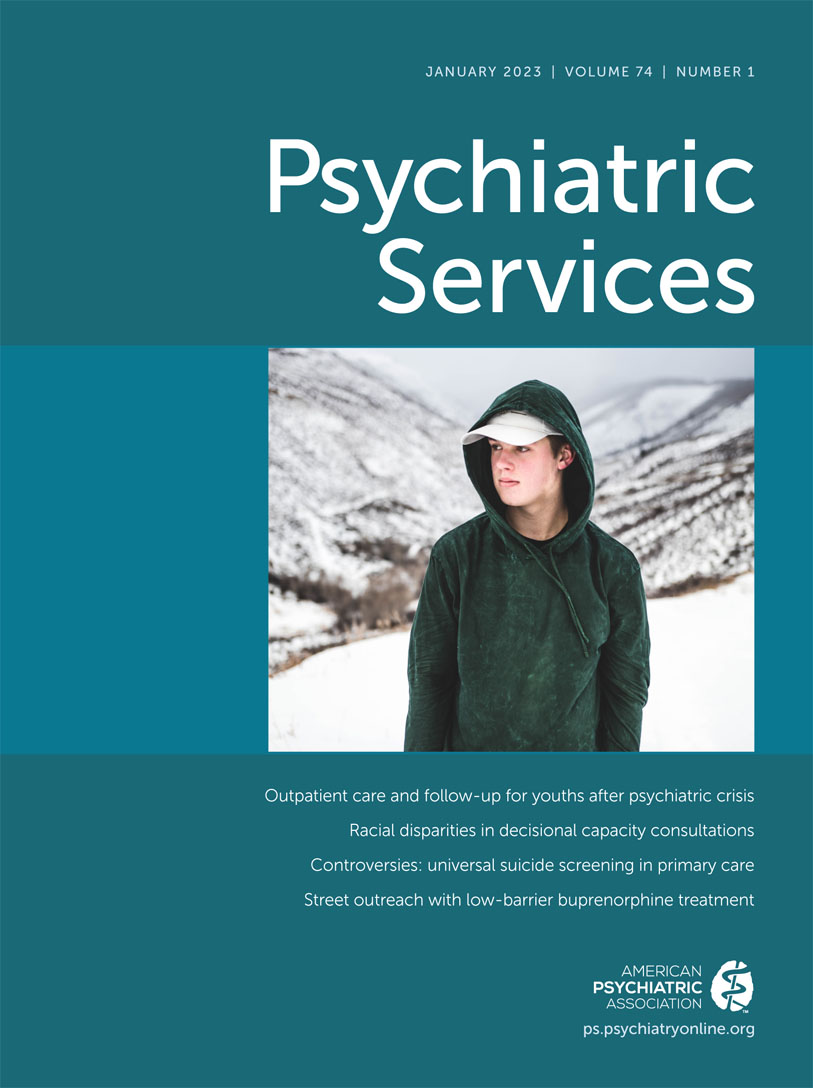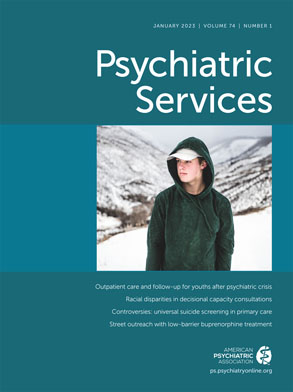Some clinical and public health experts worry that a coming benzodiazepine (BZD) usage crisis will resemble the ongoing opioid crisis. BZDs were initially marketed in the early 1960s, and prescriptions and rates of recreational use have since increased. In recognition of abuse, addiction, and other serious risks related to the medication, the U.S. Food and Drug Administration (FDA) recently updated its “boxed warning” for all BZDs. In an earlier article, we reflected briefly on the risks and benefits of BZDs (
1). In July 2021, the FDA convened a 2-day public workshop called
Safe Use of Benzodiazepines: Clinical, Regulatory, and Public Health Perspectives (
2)
. In this Open Forum, we integrate presentations from the FDA workshop with recent systematic reviews to inform an evidence-based selective prescribing of BZDs.
Experts generally agree on several issues. First, BZDs are overused. Second, they can be associated with dependency and other harms. Third, coadministration with other substances (especially opioids and alcohol) substantially increases the risk of associated harms. Fourth, BZDs have some clinical value (e.g., to treat seizure disorders and alcohol withdrawal, as a preoperative, sedative, and short-term use for acute anxiety). Fifth, safer treatments are available for chronic anxiety (antidepressants, psychotherapy) and insomnia (cognitive-behavioral therapy [CBT]). A reasoned and careful consideration of these issues is required to distinguish between appropriate and inappropriate BZD use.
Anxiety is present in around 13% of the general population and 20% of patients seen in primary care. Moreover, anxiety is the fifth-leading cause of years lived with disability (YLD), accounting for 1.5 million YLDs in the United States alone, exceeded only by major depression and three pain conditions. It is the most common mental health condition among older adults, contributing to substantial impairment and increased health care costs.
BZDs are effective treatment for anxiety
. In a meta-analysis of 58 trials enrolling more than 5,400 patients, BZDs proved to be more effective than placebo in treating generalized anxiety disorder (
3). Similarly, BZDs are more effective for panic disorder (
4) and for older adults (
5). BZDs and antidepressants have comparable effectiveness for anxiety (
6). Although antidepressants and CBT are first-line therapies for chronic anxiety, BZDs may have adjunctive value for patients who do not tolerate or respond optimally to psychotherapy or non-BZD pharmacotherapy. As with many medical and mental health conditions, combination therapy is often needed for optimal improvement. Finally, an overly restrictive approach to BZD prescription might lead to increased use of medications with less evidence of anxiolytic benefits, such as low-dose quetiapine or hydroxyzine.
Misuse of BZDs is not universal but affects a subgroup of those prescribed the medication. Of the 30 million U.S. patients using BZDs annually, approximately 1 in 6 (17%) report misuse (
7). Rates of misuse appear to be similar in countries outside the United States (
8). Misuse is often liberally defined as either nonmedical use or use in any way a doctor did not prescribe. Younger individuals and those with co-occurring substance use are at highest risk of misuse. Whereas BZD use is somewhat more common among older adults (13.7% of persons ages ≥50 report past-year use, compared with 10.2% of those ages 18–25), misuse occurs in 51% of individuals ages 18–25 who use BZDs compared with only 7% of those ages ≥50 (
7). Opioid use disorder and alcohol use disorder increase BZD misuse 20-fold and fourfold, respectively (
8). Whereas some BZDs (e.g., alprazolam) are often considered riskier than others, recent data suggest otherwise (
2).
The absolute risk of an overdose death is quite low
. Overdose deaths related to BZDs rose from 0.58 to 3.07 per 100,000 persons in the United States between 1996 and 2013 (
9), corresponding with 1.4 and 6.6 overdose deaths per 10,000 adults prescribed a BZD in these two periods. Although these figures represent a substantial increase in relative risk, it also means that the vast majority of individuals prescribed a BZD in either period (specifically 9,998 and 9,993 per 10,000 adults given a BZD prescription, respectively) did not experience an overdose death. Moreover, opioids were involved in 75% of BZD-related overdose deaths. Higher opioid doses are associated with greater risk of overdose when combined with BZDs (
10).
The paucity of evidence for long-term effectiveness is not limited to BZDs. Few anxiety treatments have been studied in long-term trials (more than 6–12 months). Historically, pharmaceutical companies have not been incentivized to test long-term drug effectiveness. Similarly, the number of studies establishing the long-term effectiveness of nonpharmacological therapies is small compared with the much larger number of studies testing benefits for 6 months or less. Thus, the argument that BZDs should not be used chronically because of insufficient long-term evidence applies to many other treatments as well, including to the accelerating use of cannabis—a substance with its own misuse potential—for anxiety, sleep, and other symptoms. Barring the possibility that all chronic use is due to dependency, the fact that millions of Americans chronically use BZDs suggests that they are experiencing anxiolytic benefits.
There are distinct differences between the BZD and opioid crises, which were highlighted by data presented at the FDA workshop (
2). Medication abuse consultant Kerri Schoedel (Altreos Research Partners) noted that individuals who use BZDs recreationally do so less frequently (average of six uses in the past 12 weeks) than those who use other substances, such as opioids, cannabis, or stimulants. Also, most individuals who use BZDs recreationally take relatively low doses (average of 2 mg for alprazolam). BZDs are infrequently the primary drug of abuse. Additionally, <15% of those who report nonmedical use of BZDs do so to get high; most use it to relax, deal with emotions, or help with sleep. FDA epidemiologist Jana McAninch noted that the number of BZD overdose deaths in 2019 was 9,711. In contrast, the number of opioid-related overdose deaths in the same year was fivefold higher (N=49,860). Although BZDs are reported as a drug of abuse in substance use disorder treatment admissions more often than prescription opioids (60,561 vs. 47,771 admissions in 2018), they are less often the primary drug of abuse in these admissions (18% vs. 63%). Most emergency department visits, poison center calls, and overdose deaths related to BZD involve opioids or other substances rather than BZDs alone. Rates of BZD addiction risk are poorly characterized. Distinguishing BZD withdrawal symptoms from anxiety symptom relapse is often difficult. Notably, as with opioids, illicit use of counterfeit or designer BZDs has increased. Finally, unlike opioids and stimulants, there is no clear difference in addiction risk between slow and rapid-onset BZDs (
2).
Although meta-analyses of case-control and cohort studies had suggested an association between BZD use and dementia, a recent cohort study of 171,286 persons in Denmark followed for a median of 6.1 years found no association between BZDs and incident dementia (
11). A case-control substudy of the same sample showed a slight risk among those who used BZDs the least (odds ratio [OR]=1.08) but an unexpected protective effect among those with the highest use (OR=0.88). Moreover, anxiety itself predicts cognitive decline (relative risk [RR]=1.77) and incident dementia (RR=1.57), thus serving as an important confounder (
12). Additionally, the evidence for clinically important cognitive deficits related to chronic BZD use is inconclusive (
13).
Falls have been a concern with BZD use among older adults. Importantly, the risk of falls with short-acting (OR=1.27) and long-acting (OR=1.81) BZDs is similar to or less than selective serotonin reuptake inhibitor antidepressants (OR=2.02), which are the recommended first-line treatment for anxiety disorders (
14). Fall risk similarly increases with use of central nervous system drugs such as anticonvulsants, anti-Parkinsonian drugs, and antipsychotics. BZD use appears to present a small increased risk of driving accidents, especially in the first few weeks of initiation, among younger patients, and possibly with long-acting BZDs. However, the absolute risk is low, and there are many potential unmeasured confounders (
15).
Most long-term BZD use involves low, stable doses
. An analysis of 41 register-based studies published between 1994 and 2014 found a 3% prevalence of long-term BZD use in the general population (about one in three BZD users). Long-term use was more common among older adults (
16). However, most chronic use was at relatively low, stable doses, with dose escalation occurring among only 2%–20% of long-term users.
Practice-based strategies may lead to more informed use of BZDs
. A shared decision-making approach to BZD dose reduction or discontinuation in which the patient has a voice is desirable. Despite a paucity of evidence-based tapering schedules, several interventions have resulted in a reduction in BZD use (
17): letters to patients educating them about BZD use, clinicians advising patients about the potential harms of BZD use, alerts to clinicians at the time of prescribing BZDs, pharmacist-to-physician detailing on specific patients, and patient support groups.
Some government policies and regulations as well as actions taken by practice plans and payers that followed the Centers for Disease Control and Prevention’s opioid guidelines were rather draconian. To find a balance between the excessive use of BZDs and a potential overreaction in terms of heavy-handed restrictions, several pragmatic recommendations include refraining from suddenly and unilaterally discontinuing BZDs in the millions of chronic BZD users, avoiding overly restrictive regulatory policies (especially governmental agencies such as the Drug Enforcement Administration, state legislatures, and licensing boards), considering patients’ access to nonpharmacological anxiety treatments, and ensuring anxiety is adequately treated and controlled if long-term BZDs are discontinued.
The tightrope between the benefits and risks of prescribing a medication that may be useful for some patients and harmful for others exists not only for controlled drugs but also for treatments such as antibiotics, which continue to be overprescribed, leading to antibiotic resistance. A multipronged strategy for BZD use that includes ongoing education of providers, patients, and the general population; surveillance to optimize selective and appropriate use; and closer oversight of outlier prescribing patterns is preferable to a stringent and exclusively regulatory approach.

